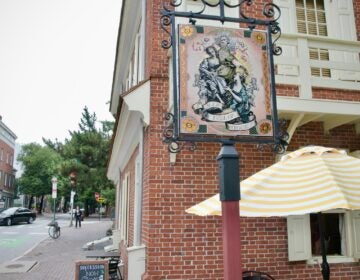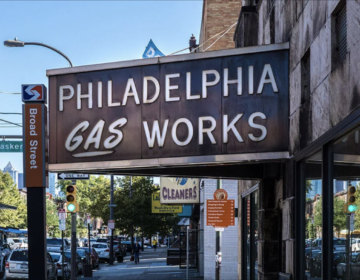In Germantown, a corner store as an engine of economic development
As Felix Gomez steadies himself against metal shelving stacked with Tide, Pine-Sol and other home-cleaning products, he smiles at the thought of his business success and the steadfast support he’s received from the Germantown residents who live around his new store.
“They tell me, ‘Papi, you do good,'” he says inside his spiffed-up corner store at 4562 Wayne Ave., which has been the center of the past four months of his life.
Located at the east end of Wayne Avenue, Gomez Market has gotten a facelift from its previous identity as Penny Saver Market, which had reached the most advanced stage of development as part of Philadelphia’s Healthy Corner Store Initiative, with refrigerators for fresh fruits and vegetables and other healthy-food alternatives.
With his own labor, Gomez has transformed what was once a drab, brick facade in the middle of a non-descript block into a store with a bold, blue awning splashed with red and white lettering advertising Gomez’s featured products.
An expansion plan
The new Gomez Market is testimony not only to the value of offering healthy food, but also of the role that corner stores can play in spurring economic development and improvement in local neighborhoods.
Gomez, a 41-year-old immigrant from the Dominican Republic, used his earnings from the sale of his corner store at 25th Street and Allegheny Avenue to purchase the Penny Saver Market when its owner, a Korean woman, was forced to sell after sustaining injuries in a car accident.
So far, Gomez has invested $210,000 in the purchase and renovations of his new store, which is a work in progress.
Exposed plywood sits adjacent to checkered tiles which have yet to be replaced. The bank of refrigerators serves as storage for paper goods. The back left corner that looks like an unfinished construction zone will soon be a furnished office with Internet connection.
Gomez is an example of the business success by Dominican immigrants, who own an estimated 80 percent of the corner stores in Philadelphia, including those in Germantown. After moving to America with his family nine years ago, Gomez lived in New Jersey before settling in Philadelphia, where he has been involved in the operation of corner stores for seven years.
He was the sole proprietor of Rodriguez Grocery in Kensington. When the opportunity came to upgrade, he jumped at the chance to open a new business at a bigger and better location.
Healthy offerings
Gomez has not yet officially signed onto the Healthy Corner Store Initiative operated the Food Trust, a Philadelphia nonprofit, but the presence of healthy foods in his store prove his belief in the importance of a variety of options for customers.
Though most corner stores are known for stocking junk foods, Gomez’s establishment offers healthy alternatives at competitive pricing, including fresh and canned vegetables, deli meats, dairy products and bread.
Norman Whitest frequents Gomez Market “almost every day” to buy snacks for his kids, cat food and lottery tickets, but he will occasionally pick up some essentials between bi-weekly trips to the grocery store. On this particular day, he stopped in to purchase canned pork and beans for dinner.
“It’s easier to come here than to catch the bus to the grocery store,” said Whitest, who lives nearby.
The scene
Walking into the store, one gets the feel of a small supermarket. The displays of potato chips, shelves of pasta and deli counters maintain proportional prominence.
Gomez doesn’t choose to sequester the raw potatoes, milk, eggs and whole-wheat products on an aisle of their own. They are integrated throughout the aisles that line the store.
As you push through the doors, bread sits underneath packaged powdered donuts and snack cakes. The milk sits in refrigerators behind fresh cuts of ham and turkey in the deli and across from rows of beans and Ramen noodles.
First-time customers, sisters Wanda and Jeresia English, thought Gomez was doing a service by offering healthier foods, but admitted there were some drawbacks.
“It’s good for a last-minute run, because it’s so convenient. But, oh yeah, it costs more,” they said as they munched on bags of Smartfood popcorn purchased as a way to break change for the bus.
Price points
One of the market’s employees said there are bargains to be had at Gomez.
“Some stuff sells for more at ShopRite,” he said. “We try to give good prices for our customers.”
Michael Bradley, a recent graduate from Cheney University and a veteran of the Iraq War, heard about the great deal on Gomez’s hoagies from a friend.
“All the ingredients are really fresh, and it’s only $5,” said Bradley, noting he’s gotten a buffalo-chicken hoagie almost every day since he heard about the price.
A majority of the money that Gomez has invested in his new market came from the sale of Rodriguez Grocery, and the remainder has been borrowed through PNC bank.
The store is still in its infancy, so it isn’t generating the profits Gomez hopes to have once renovations are completed and more products are stocked. Bills come to $54,000 per month, but the store makes an average of $2,000 per day, he said.
By keeping his payroll costs down — he has hired only three employees — Gomez figures he will be able to expand and experiment with the sale of new, healthy foods, such as 100 percent fruit juices, and packaged cuts of meats. He also plans add a grill to the deli so he can sell hot sandwiches and cheesesteaks.
Does Gomez think his customers will buy into the healthy change?
“People really like the sugars and sweets,” he said.
But he’s willing to try.
****
GermantownBeat, a NewsWorks content partner, is a local news Web site produced by student journalists at La Salle University. The editors of GermantownBeat are assistant professors in La Salle’s Communication Department. NewsWorks will feature the students’ work on its Northwest Philadelphia community sites, and provide training and advice in multimedia journalism to the program.
WHYY is your source for fact-based, in-depth journalism and information. As a nonprofit organization, we rely on financial support from readers like you. Please give today.




